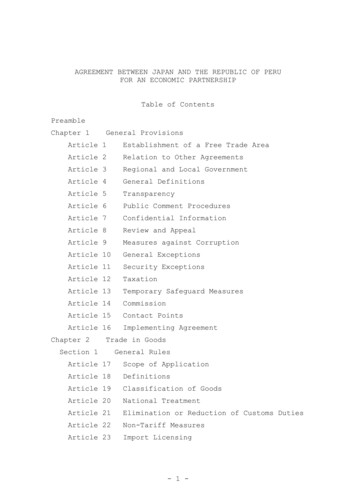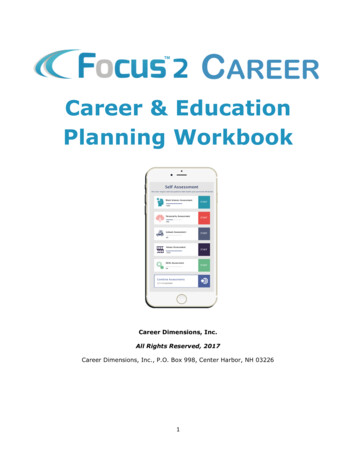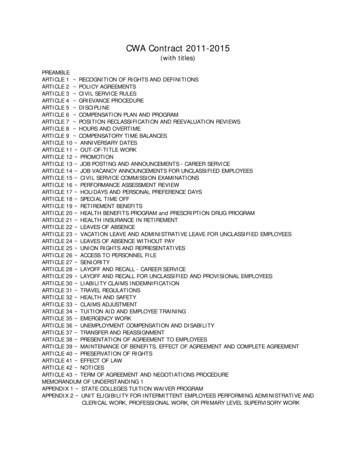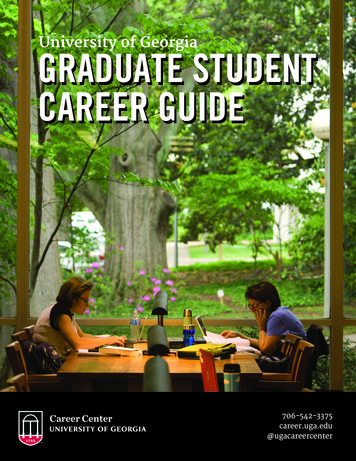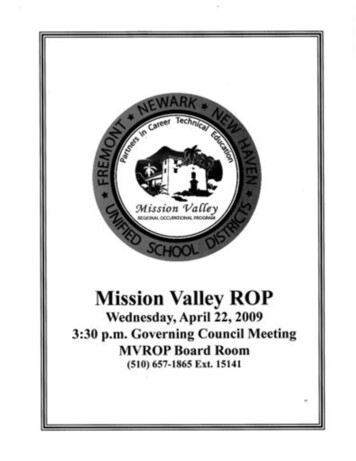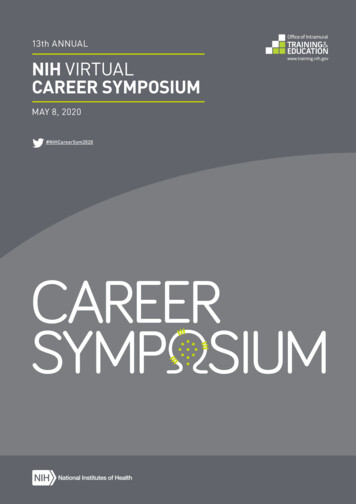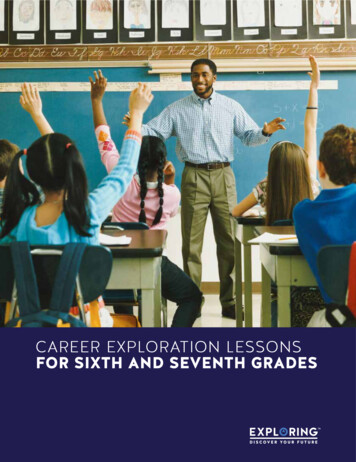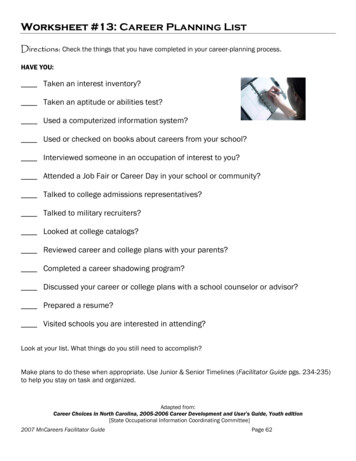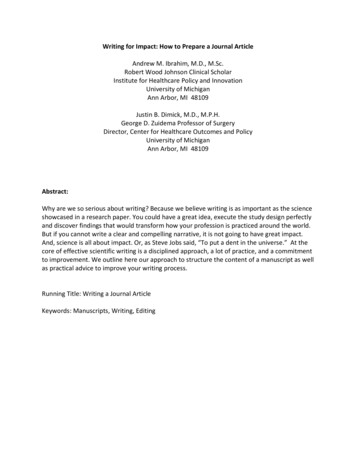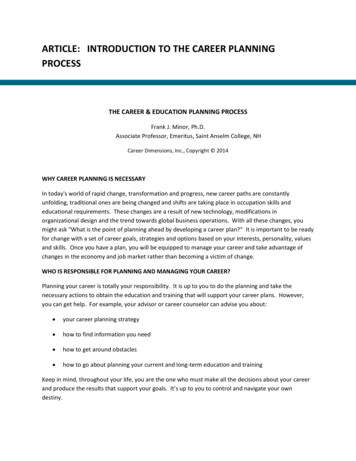
Transcription
ARTICLE: INTRODUCTION TO THE CAREER PLANNINGPROCESSTHE CAREER & EDUCATION PLANNING PROCESSFrank J. Minor, Ph.D.Associate Professor, Emeritus, Saint Anselm College, NHCareer Dimensions, Inc., Copyright 2014WHY CAREER PLANNING IS NECESSARYIn today's world of rapid change, transformation and progress, new career paths are constantlyunfolding, traditional ones are being changed and shifts are taking place in occupation skills andeducational requirements. These changes are a result of new technology, modifications inorganizational design and the trend towards global business operations. With all these changes, youmight ask "What is the point of planning ahead by developing a career plan?" It is important to be readyfor change with a set of career goals, strategies and options based on your interests, personality, valuesand skills. Once you have a plan, you will be equipped to manage your career and take advantage ofchanges in the economy and job market rather than becoming a victim of change.WHO IS RESPONSIBLE FOR PLANNING AND MANAGING YOUR CAREER?Planning your career is totally your responsibility. It is up to you to do the planning and take thenecessary actions to obtain the education and training that will support your career plans. However,you can get help. For example, your advisor or career counselor can advise you about: your career planning strategy how to find information you need how to get around obstacles how to go about planning your current and long-term education and trainingKeep in mind, throughout your life, you are the one who must make all the decisions about your careerand produce the results that support your goals. It’s up to you to control and navigate your owndestiny.
THE IMPORTANCE OF SELF ASSESSMENTUnderstanding yourself is a critical aspect of career and educational exploration and planning. The moreyou know about your career-related interests, values, skills, personality type and preferences, the betterequipped you will be to identify the career fields, major areas of study and training programs, andeducation pathways that are compatible with your personal attributes. The FOCUS 2 system will helpyou develop an accurate self-assessment of your personal qualities: Your Work Interests are a reflection of the kinds ofwork-related activities and tasks you most enjoydoing. Your Personality Type is a description of how youreact to certain situations and people and how youmake decisions, organize information and solveproblems. Your Values are a description of what is mostimportant to you in life. For example, you mightvalue earning a lot of money, helping other people,being creative and artistic, having a secure and steadyjob, etc. Your Skills are a reflection of your talents and the activities you easily learn and perform well. Your Leisure Time Interests are a reflection of the kinds of leisure-related activities you mostenjoy doing.THE BIG PICTURE: YOUR LIFE PLANIt is a good idea to plan your career based on the big picture, that is, your life plan. Ask yourself, “Whatkind of life do I want to lead?” As you can imagine, your career decisions will dramatically impact yourlifestyle. Your occupation will influenceyour income work hours travel job security colleagues and friends leisure time
where you liveQuestions you need to ask yourself about your life plan are: What principles am I committed to as a person? i.e. family, security, prestige, accomplishments. What kinds of experiences do I want in my life? i.e. travel, adventure, cultural. What personal talents do I want to develop? i.e. music, art, language, communication,intellectual. How do I like to spend my leisure time? i.e. community services, recreation and sports, travel.Finally, you must ask yourself whether the occupational goals and educational avenues you areconsidering will be supportive of your life plan.ROLES YOU PLAY IN YOUR LIFEBeing a worker will be interconnected with other roles you play in life. Examples of roles that areaffected by your career could include being a parent, a community citizen, a student, a recreationist.Your career reaches beyond being a wage earner in your chosen occupation. For example, consider thefollowing scenario: If you were a wage earner, parent, andstudent then clearly your income must be sufficient to payfor the expenses incurred in these other roles.Most people are primarily involved with two or three rolesat a time. Which roles you are focusing on depends uponyour age and life stage. For example, in college, yourprinciple roles may be as student and recreationist. Later inlife your principle roles may be as worker and parent. Thepoint is that throughout your life you will play acombination of work, leisure, study, homemaking andcitizen roles that are intermixed. Therefore when you makedecisions about your career, you should take into consideration the effect of these career decisions onthe other areas of your life.THE LIFE-CAREER RAINBOWRefer to the Life-Career Rainbow Chart below to get a better picture of the kind of roles you may play atvarious ages and stages of your career and life.The two outer arcs of the Life-Career Rainbow show you the life stages you may move through duringyour career and life, and your approximate age in each. The lower arcs of the Life-Career Rainbow showyou the different roles you may engage in while in different life stages and ages.
SUMMING IT ALL UPHere is how to take the ‘Big Picture’ into consideration when making career and education plans:First, when choosing an occupation, think about which of your options will most likely provide you withself-fulfillment in all your roles, not only in the present, but in the future.Second, periodically re-examine your career plans, take stock of yourself and what’s happening in yourlife, and then make adjustments in your career as needed. For example, changes in your career fieldmay require that you learn new skills, or changes in your personal interests, values, social or familysituations may affect your career aspirations.BENEFITS OF HAVING A CAREER PLANOnce you have established your career goals you will be better able to make choices about your collegemajor and minor areas of study and the courses you should take. Your career goals will also enable youto make decisions about personal developmental activities while in college such as internships,volunteer work and summer jobs. Research has shown that there are many significant advantages andbenefits of having career plans. College students with career plans: Are less likely to make costly changes in their college education plans and are more likely tograduate on time. Are more confident and satisfied with their choice of an occupation and major area of study.
Achieve higher college grades because their decisions about their educational path arecompatible with and based on their personal interests, values and abilities. Earn higher incomes in their entry jobsWhile in college, it’s a good idea to map out an action plan that leads you to your goals. The plan canserve as a reference that you and your advisers can monitor and adjust as needed.SEEKING EXPERT ADVICE: CAREER COUNSELINGIn conjunction with using FOCUS 2, you may want to meet with a career counselor, mentor or advisor.Be prepared to ask questions concerning: Your career-related interests, values, personality and abilities. Your present occupational, educational and college/training goalsand plans. Responsibilities or obstacles that are interfering with your careerand college/training decision-making. Your life plan, life style desires and strategies to achieve your goals.Your career advisor can give you ideas and information to help you: Verify the rationale of your career decisions and education plans. Help you develop your long-term educational path. Pinpoint your personal development needs that will help you to achieve your goals. Suggest ways to get around any obstacles that are interfering with your decision-making andplanning. Formulate strategies and action plans to achieve your career and educational objectives.Career Planning is a lifelong process of exploration and planning of your career and educational goalscompatible with your interests, values, talents, personality and aspirations. Career planning involvesthinking about which educational and occupational paths will provide you with satisfaction andfulfillment in all aspects of your life, present and future.
Career Planning is a lifelong process of exploration and planning of your career and educational goals compatible with your interests, values, talents, personality and aspirations. Career planning involves thinking about which educational and occupatio
